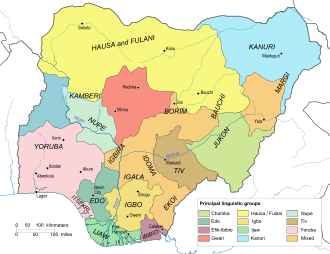Chinua Achebe: Difference between revisions
Nigerian author and literary critic (1930–2013)
Chinua Achebe (; born Albert Chinụalụmọgụ Achebe;16 November 1930 – 21 March 2013) was a Nigerian novelist, poet, and critic who is regarded as a central figure of modern African literature. His first novel and magnum opus, Things Fall Apart (1958), occupies a pivotal place in African literature and remains the most widely studied, translated, and read African novel. Along with Things Fall Apart, his No Longer at Ease (1960) and Arrow of God (1964) complete the “African Trilogy”. Later novels include A Man of the People (1966) and Anthills of the Savannah (1987). In the West, Achebe is often referred to as the “father of African literature”, although he vigorously rejected the characterization.
Born in Ogidi, Colonial Nigeria, Achebe’s childhood was influenced by both Igbo traditional culture and postcolonial Christianity. He excelled in school and attended what is now the University of Ibadan, where he became fiercely critical of how Western literature depicted Africa. Moving to Lagos after graduation, he worked for the Nigerian Broadcasting Service (NBS) and garnered international attention for his 1958 novel Things Fall Apart. In less than 10 years he would publish four further novels through the publisher Heinemann, with whom he began the Heinemann African Writers Series and galvanized the careers of African writers, such as Ngũgĩ wa Thiong’o and Flora Nwapa.
Achebe sought to escape the colonial perspective that framed African literature at the time, and drew from the traditions of the Igbo people, Christian influences, and the clash of Western and African values to create a uniquely African voice. He wrote in and defended the use of English, describing it as a means to reach a broad audience, particularly readers of colonial nations. In 1975 he gave a controversial lecture, “An Image of Africa: Racism in Conrad’s Heart of Darkness“, which was a landmark in postcolonial discourse. Published in The Massachusetts Review, it featured criticism of Albert Schweitzer and Joseph Conrad, whom Achebe described as “a thoroughgoing racist.” When the region of Biafra broke away from Nigeria in 1967, Achebe supported Biafran independence and acted as ambassador for the people of the movement. The subsequent Nigerian Civil War ravaged the populace, and he appealed to the people of Europe and the Americas for aid. When the Nigerian government retook the region in 1970, he involved himself in political parties but soon became disillusioned by his frustration over the continuous corruption and elitism he witnessed. He lived in the United States for several years in the 1970s, and returned to the US in 1990 after a car crash left him partially paralyzed. He stayed in the US in a nineteen-year tenure at Bard College as a professor of languages and literature.
Winning the 2007 Man Booker International Prize, from 2009 until his death he was Professor of African Studies at Brown University. Achebe’s work has been extensively analyzed and a vast body of scholarly work discussing it has arisen. In addition to his seminal novels, Achebe’s oeuvre includes numerous short stories, poetry, essays and children’s books. His style relies heavily on the Igbo oral tradition, and combines straightforward narration with representations of folk stories, proverbs, and oratory. Among the many themes his works cover are culture and colonialism, masculinity and femininity, politics, and history. His legacy is celebrated annually at the Chinua Achebe Literary Festival.
Life and career
Youth and background (1930–1947)

Chinua Achebe was born on 16 November 1930 and baptised Albert Chinụalụmọgụ Achebe.[a] His father, Isaiah Okafo Achebe, was a teacher and evangelist, and his mother, Janet Anaenechi Iloegbunam, was the daughter of a blacksmith from Awka, a leader among church women, and a vegetable farmer. His birthplace was Saint Simon’s Church, Nneobi, which was near the Igbo village of Ogidi; the area was part of the British colony of Nigeria at the time. Isaiah was the nephew of Udoh Osinyi, a leader in Ogidi with a “reputation for tolerance”; orphaned as a young man, Isaiah was an early Ogidi convert to Christianity. Both Isaiah and Janet stood at a crossroads of traditional culture and Christian influence, which made a significant impact on the children, especially Chinua. His parents were converts to the Protestant Church Mission Society (CMS) in Nigeria.[7] As such, Isaiah stopped practicing Odinani, the religious practices of his ancestors, but continued to respect its traditions. The Achebe family had five other surviving children, named in a fusion of traditional words relating to their new religion: Frank Okwuofu, John Chukwuemeka Ifeanyichukwu, Zinobia Uzoma, Augustine Ndubisi, and Grace Nwanneka. After the youngest…
Read More: Chinua Achebe: Difference between revisions

